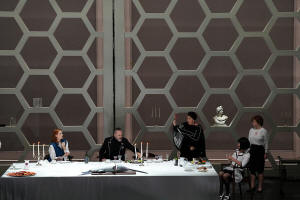|
The
play develops in parallel worlds, one inhabited by Cassandra,
cursed by ancient Greek gods to be disbelieved by contemporaries
as she foresees the fall of their city of Troy, which inevitably
materializes in a bloody carnage.
Her modern incarnation is Sandra, a scientist specializing in
analyzing data from icebergs and terrified by the violent future
she reads from the record pace of melting ice.
Unable to get her message across, Sandra takes to stand-up
comedy to try to elicit a change in behavior.
The sound of cracking ice blends into the music composed by
Bernard Foccroulle, and librettist Matthew Jocelyn said some of
the twists in the story were inspired by discussions with young
climate activists.
As large white vertical sheets hanging in the background to
resemble an iceberg drop to the ground one after another
throughout the play, Cassandra and Sandra ponder if it is them
who see more than the others, or do people refuse to acknowledge
what lies in front of their own eyes, the question accentuated
by the opera's blindfolded choir.
The 1-1/2 hour opera offers no catharsis, leaving the audience
uncomfortable with Sandra's parting lines, a question she throws
at people: "What now?"
(Reporting by Gabriela Baczynska; Editing by Alison Williams)
[© 2023 Thomson Reuters. All rights
reserved.]
This material may not be published,
broadcast, rewritten or redistributed.
Thompson Reuters is solely responsible for this content.

|
|




